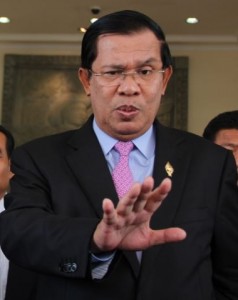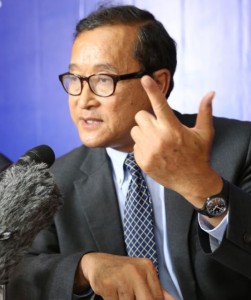With the main political opposition disabled and an increasingly authoritarian government, Cambodia faces a political crisis, writes JONATHAN BOGAIS.
Cambodia is on the brink of a political crisis, facing a return to the autocratic modus operandi that has been the hallmark of its politics for many years.
This follows a sudden government crackdown on the opposition party, the Cambodian National Rescue Party (CNRP), led by Sam Rainsy—and a stream of legislation that is likely to curtail the ability of civil society to function in fair and safe conditions.
The United Nations Human Rights Rapporteur for Cambodia, Rhona Smith, warned recently that the increased political infighting in Cambodia, accompanied by a rise in rights abuses—including incidences of violence, intimidation of individuals and resort to offensive language in the political discourse—could bring Cambodia to ‘a dangerous tipping point’.
Nearly two-and-a-half decades have elapsed since the signing of the 1991 UN-sponsored Paris Peace Agreement, aimed at ending the conflict in Cambodia. This landmark agreement has been followed by a considerable and uninterrupted flow of international aid and foreign investment to help create prosperity in a country desperately in need of rebuilding itself. The agreement was also intended to offer investors financial opportunities by giving them access to a new, untapped market in Southeast Asia.
Bleak future
Economic development programs of this magnitude should have led to dramatic changes in Cambodia’s social and economic landscape. Instead, poverty and inequality are endemic, and the future looks bleak for a population of 15 million, of which 52 per cent are under 25—a legacy of the Khmer Rouge era.
In Channel News Asia’s Between the Lines program on 23 November, Cambodia’s spokesman for the Council of Ministers, Phay Siphan, claimed Cambodians were ‘happy, happy on the street, happy in the rice fields, happy because they had money to spend’.

After decades of suffering caused by genocide and war, the apparent lack of political violence is no doubt a source of happiness for most Cambodians but, as UN Development Programme data shows, 19.8 per cent of the population live below the poverty line and 45.9 per cent live in multidimensional poverty. Inequality is rampant, especially in rural areas, where 80 per cent of the population lives and 90 per cent of the country’s ‘poor’ are found.
According to the Asian Development Bank, income poverty has fallen, but many families teeter just above the poverty line. With a large part of the population concentrated at the bottom of the income distribution, the poverty rate is highly sensitive to where the line is drawn. Vulnerability to poverty has increased in recent years and urban poverty appears to be rising as people are affected by a range of issues such as the rising cost of living, exploitation of workers, land grabs and poor health and education delivery services.
Although the Cambodian government prides itself on leading a multi-party democracy with free and fair elections and a rule of law, the reality is quite different, suggesting that democracy, in the eyes of the ruling Cambodian People’s Party (CPP), is a one-sided system in which repression is a substitute for consultation.
After nearly two-and-a-half decades of the same ‘Hun Sen-led politics’, dissatisfaction is growing and antigovernment voices are rising among young people eager for change, while civil society is becoming increasingly more resilient and vibrant despite restrictions. A surge of activism has followed the 2013 elections, which were fraught by irregularities, according to the opposition and many international observers, demonstrating that activist networks could mobilise in the face of the ‘common enemy’—the CPP, led by Prime Minister Hun Sen.
Last month, the hopes of Hun Sen’s opponents received a major boost following the election success of Aung San Suu Kyi’s National League for Democracy (NLD) against the long-standing, military-supported government in Myanmar’s election. The result sent shockwaves through government circles in Phnom Penh, bringing fear that similar changes could happen in Cambodia.
With defeat in the 2018 elections looming, the Hun Sen government has put in place a series of radical measures to secure its long-term position—to silence both the opposition and civil society.

]On 13 November, at the request of Foreign Minister Hor Namhong, the Phnom Penh Municipal Court issued a warrant for the arrest of Sam Rainsy over a longstanding defamation case dating back to 2008. In 2011, the court found Rainsy guilty of defamation—a conviction that carries a prison term—and sentenced him to two years jail. The sentence, however, was never enforced, as the hostility between Rainsy and Hun Sen eased, and Rainsy was allowed to pursue his political activities and enjoy parliamentary immunity.
Namhong’s decision to request the immediate enforcement of the verdict coincided with anti-CPP demonstrations during Hun Sen’s official visit to France on 25 and 26 October. Fearing embarrassment, Hun Sen had warned his opponents that any anti-CPP demonstrations would attract reprisals against the CNRP.
Cambodian expatriates living in France intended to expose human rights violations committed by the regime and its supporters as Hun Sen was due to meet with French president François Hollande. A counter demonstration in which an estimated 1,000 CPP supporters descended upon the National Assembly in Phnom Penh took place soon after, during which two CNRP lawmakers, Nhay Chamroeun and Kong Sakphea, were severely beaten. Hun Sen denied responsibility for the incident.
Adding fuel to an already heated political debate, Rainsy said that the NLD’s success in Myanmar was evidence that ‘the days of authoritarian regimes were counted, and it was only a matter of time before true democracy would reach Cambodia’. And during his visit in Tokyo last month, he called on the international community to ensure that the 2018 elections would be ‘held on time and according to democratic rules’.
Speaking on Between the Lines, Phay Siphan, said ‘the rule of law applied to all in Cambodia, and Sam Rainsy was not above it’—and would be arrested on his return to Cambodia.
In other signs of a growing crackdown on opposition, the government last month approved a law intended to curtail union power and impose stringent conditions on workers—despite the absence of the CNRP, which boycotted the vote in protest at the ruling party’s ousting of CNRP vice-president Kem Sokha from his post of vice-president of the National Assembly.
In August, in the face of widespread national and international criticism, Hun Sen signed and promulgated a controversial law on associations and non-governmental organisations that hit hard at the heart of civil society. Among the concerns about the law is a mandatory requirement for all domestic and international associations to be registered.
Appeasing the international community to ensure ongoing support and investment while ruling his country with an iron fist is one of Hun Sen’s greatest skills.
The law also gives the Ministry of Interior unrestricted discretion over registration and requires all associations and organisations to be politically neutral. Human rights advocates fear it could restrict fundamental human rights, such as freedom of expression and assembly, and increase land rights violations
In yet another example of tightening government control, two weeks ago the Council of Ministers approved a potentially sweeping draft law to regulate the telecommunications sector and put it under the control of the Ministry of Posts and Telecommunications.
By banning the two most prominent CNRP leaders—Sam Rainsy and Kem Sokha—from politics, Hun Sen has disabled the main political opposition, at least temporarily, two-and-a-half years before the next elections. He has demonstrated again his ability to achieve what he wants, as he has done successfully during the last decades, often in a ruthless manner.
Short of the usual criticisms, the current crackdown in Cambodia is barely rising an eyebrow among international actors. Appeasing the international community to ensure ongoing support and investment while ruling his country with an iron fist is one of Hun Sen’s greatest skills, which he has demonstrated many times before.
Cambodia is entering a critical juncture. How Hun Sen faces growing opposition to his authoritarian regime and how far he will be prepared to go to repress a social push for change will decide the future of Cambodia.
Main photo:
Police block an NGO rally in Phnom Penh in 2013. Such demonstrations might become more common after Hun Sen signed and promulgated a controversial law on associations and non-governmental organisations in August (Image credit: Wikimedia Commons/VOA Khmer).


Pingback: Sydney Democracy NetworkARTICLE | Cambodia on the brink - Sydney Democracy Network